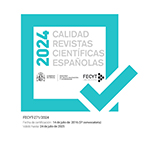La mujer y su posible discriminación en el contexto de la diversidad religiosa del postsecularismo español desde el punto de vista jurídico
Resumen
España es un país con una larga tradición católica, Iglesia que ha tenido una influencia significativa en nuestra sociedad, durante siglos, reflejada con claridad, por ejemplo, en su posición conservadora en asuntos de género y sexualidad.
A raíz de la Constitución de 1978, se iniciaron algunos cambios en nuestro país en este ámbito, al establecerse en ella la igualdad de género como un principio fundamental. Comenzó con nuestro texto Magno además en España un claro proceso de secularización y modernización, que debilitaría la influencia del catolicismo en la sociedad y fomentaría, en nuestra sociedad laica, un claro desinterés por todo lo religioso, con una evidente disminución de la práctica religiosa, lo que hizo que se empezase a evolucionar significativamente en las actitudes hacia el género y la igualdad de género.
A finales del siglo XX surgiría el concepto de la postsecularización y la religión volvería a adquirir relevancia en la esfera pública y en la vida social. En este trabajo se afrontará el desafío jurídico de analizar, en el contexto de diversidad religiosa y de complejidad del fenómeno religioso de esta era postsecular, el papel de la mujer y su posible discriminación o no en dicho ámbito en nuestra España del siglo XXI para estudiar los límites que puede imponer el legislador a la incitación a la violencia contra las mujeres que se fundamente en creencias religiosas y/o culturales relativas al género.
Descargas
Descarga artículo
Licencia
La revista 'Ilu. Revista de Ciencias de las Religiones, para fomentar el intercambio global del conocimiento, facilita el acceso sin restricciones a sus contenidos desde el momento de su publicación en la presente edición electrónica, y por eso es una revista de acceso abierto. Los originales publicados en esta revista son propiedad de la Universidad Complutense de Madrid y es obligatorio citar su procedencia en cualquier reproducción total o parcial. Todos los contenidos se distribuyen bajo una licencia de uso y distribución Creative Commons Reconocimiento 4.0 (CC BY 4.0). Esta circunstancia ha de hacerse constar expresamente de esta forma cuando sea necesario. Puede consultar la versión informativa y el texto legal de la licencia.











